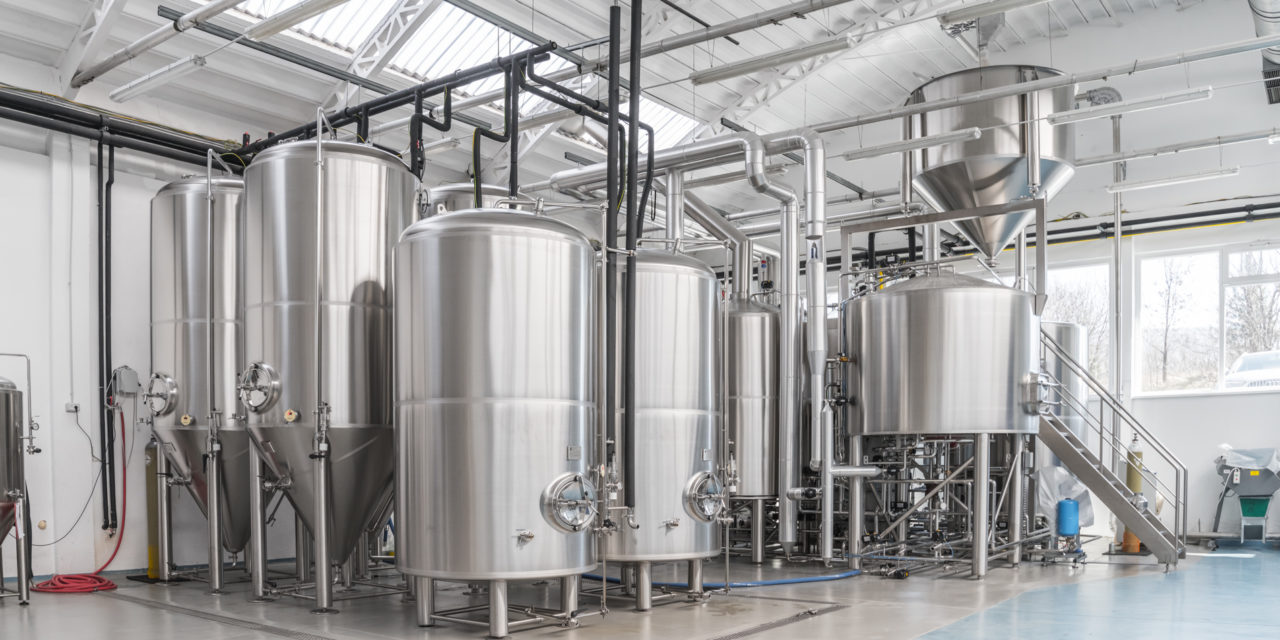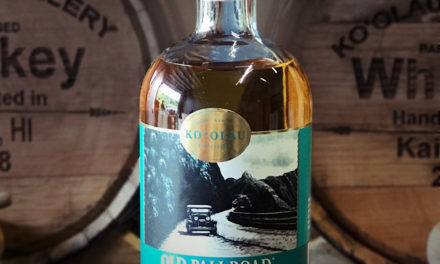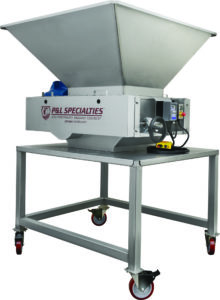
P&L Specialties’ Consista-Hopper [Photo courtesy P&L]
Pressing, sorting & prep technology
In 2019, after a soft introduction the previous year, P&L Specialties rolled out its Consista-Hopper, which lets wineries process entire half-ton bins of grapes at once. “In processing grapes, one of the most important things you can do, mechanically, is to make sure the grape destemmer is being fed evenly and at the proper speed,” says Ed Barr, president of the Santa Rosa, Calif.-based company. The Consista-Hopper introduces a helix-based design (rather than a vibrating or elliptical oscillating table) that can be adjusted to more carefully regulate grape throughput speed to the destemmer.
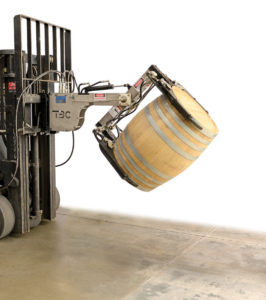
Tom Beard Company’s barrel-picker in action [Photo courtesy Tom Beard Co.]
P&L’s affiliate Tom Beard Company, which focuses predominantly on barrel- and bin-handling and washing devices, also introduced two new products in 2019. Its combo washer/steamer allows for automated washing or steaming (or both) for cleaning barrels, and is compatible with 2- and 4-barrel racks. The company also recently patented and rolled out a new barrel-picking device, which can attach to a forklift mast to safely remove barrels from a delivery truck and handle them in the cellar.
Based stateside in Fairfield, Calif., Euromachines will debut a fully redesigned version of its Europress programmable grape press in early 2020. The Europress EP offers a number of new programmable options, including humidity control (with sensors measuring the residual humidity inside the drum), drum temperature probes and cooling jackets, drain-control options that adjust the program according to real-time juice flow, a SOLUS option that builds programs according to how the user presses manually, and expanded programming features for handling different fruit types and peak pressures. Sales and Service Manager Harvey Gonzalez notes a number of the new options were developed for white wine producers, particularly the ability to regulate the drum’s temperature. The company will offer these programmable presses in sizes ranging from 15hL up to 65hL, in both open- and closed-drum styles.
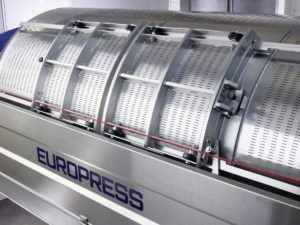
Euromachines’ fully redesigned version of its Europress programmable grape press [Photo courtesy of Euromachines]
System solutions
Criveller Group in Healdsburg, Calif., which offers processing, production, and bottling equipment for the wine, beer, distillates, olive oil, and cannabis industries, has recently introduced a wide variety of new technologies and automation processes into its portfolio. On the wine-press side of things, the company introduced touch-screen panels to its wine presses about four or five years ago; it’s since semi-automated that process so operators can rotate the system’s cylinder, reposition doors, and get a lot more flexibility from their press operations.
Criveller has also been working on semi-automated brewhouses, including an upcoming 50-barrel system for Fieldwork Brewing Co. in Berkeley, Calif., with features that automate specific key steps (mashing, lautering, and vorlauf) to increase efficiencies while improving consistency and lessening operator error. Criveller has also been working with the folks at Sonoma Distilling Company in Rohnert Park, Calif., to design and develop preheating mash tanks (with internal coils that preheat the mash) and mash mixers for the distilling industry. The company will also be introducing a lees cross-flow filter within the next six months, with improved filtering for wine and cider lees.
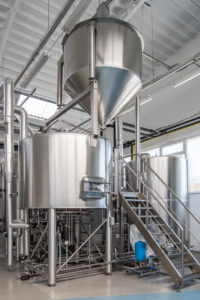
Prospero’s 30 BBL 2-vessel brewhouse mash/lauter tun with combination boil kettle/whirlpool [Photo courtesy Prospero]
Prospero also now offers a 5-vessel, 30-barrel brewhouse, which is intended to cost less than a traditional 40- or 50-barrel system while allowing for a comparable amount of beer production. “It does two things for a large commercial brewery,” DiDonato notes: “It saves space, and it costs less money than a larger system.” The compact system includes two mash/lauter tuns, two kettles, and a whirlpool (plus separate hot and cold tanks). “That lets a brewery mash/lauter in the first two vessels and then get those emptied to transfer right into the next two kettles. It just lets them brew much more quickly.” The system can make up to 85,000 barrels annually, and it’s currently being used by clients such as Belching Beaver Brewery (San Diego, Calif.) and Speakeasy Ales & Lagers (San Francsico, Calif.).
In addition to being a key supplier of acidulants and chemicals, ATPGroup of Windsor, Calif., offers a complete line of production equipment to the wine and beer industries, including brewing systems that scale in volume from half a barrel up to about 140 barrels in size. Its newest offering to the North American brewing market has been partner TMCI Padovan’s Dynamos rotary cross-flow filter system; it’s an established technology in wineries but is just now making an impact on the brewery side. ATPGroup has been testing it at breweries for the past year (typically large, regional breweries, which have enough tank bottoms to make the filter system economically viable).
The cross-flow system uses a series of rotating ceramic discs to get better filtration power relative to a traditional ceramic-membrane system. ATPGroup’s Christopher Atkinson says, “You can recover at least half of your spent yeast loads as useful beer for going back into the process,” meaning larger brewers can potentially recover a couple batches worth of beer over the course of a month. Breweries might also be able to increase the value of their waste streams if those are being used to generate revenue.
On the winery side, ATPGroup has introduced various automation processes from industry partner Parsec, including the SAEn 5000 series micro-oxygenation system for remotely controlling the oxygenation of wine tanks. Other new products launched recently include a continuous pneumatic press from Italian partner Siprem International (designed to increase grape-pressing speed while also maintaining gentle, soft pressure) as well as the continuous tartaric stabilization system (K-Stop) from TMCI Padovan, which helps wineries bottle wines sooner than through traditional means.
Automating Palletizers & dippers
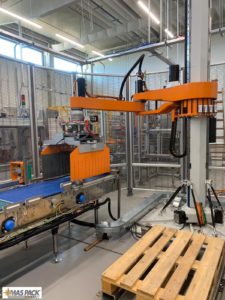
Maspak Packaging USA’s Minipal 17 HS palletizing system [Photo courtesy Maspak]
Lastly, Emmeti USA (based in Tampa, Fla., but part of global EMS Group of Italy) debuted a number of new pallet, keg, glass, pouch, and plastic container handling technologies, including the Compact Genius Palletizer, a mobile case palletizer that can be forklifted out of the way when it’s not being used. Geared for smaller producers, it takes about an hour to set up and can process a maximum of about 10 cases per minute. Simply feed the pallet pattern into the camera system and the unit is ready to palletize.
Emmeti’s Wax-On equipment helps automate the process of dipping wine, beer, or spirit bottles in wax for a high-end finish and can be configured as either a semi-automatic or fully automatic solution in tandem with Emmeti’s other depelletizing, palletizing, case packing, carton erecting, partition inserters and conveyor systems. The company also now offers a number of different combo depalletizers, which are designed for producers looking to do both bulk and case depalletizing with a single system; for suppliers that need to rainbow palletize, Emmeti can mix products on a pallet.
The alcohol beverage industry is always adapting to new circumstances and new technology. By staying up with the latest developments, producers can evolve their products and processes with confidence, knowing they’re doing everything possible to create their very best.

